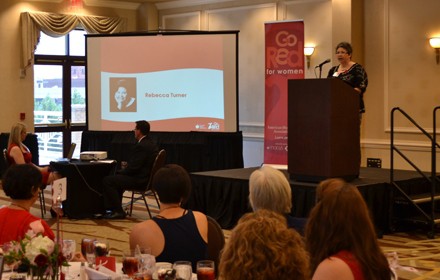A Heart for Survival: Opera Professor's New Role as Advocate

“November 1, 2010…. the day started like any other at that time in my life. However, by 7:50 a.m., my life was changed forever.”
The opening words of Converse Opera Theatre director Becky Turner chilled the room of 100 women who gathered for the American Heart Association’s Go Red for Women luncheon in Spartanburg. Turner, who is quite comfortable sharing her singing voice, found herself in a new role – lifting her voice as an advocate for heart disease awareness. She was tapped to share her experience with a heart attack, and the lesser-known risk factors, symptoms, and critical decisions that can turn a victim into a survivor. Joining her at the event were colleagues and friends who came to support and applaud her courage to speak out.
Facts on Heart Disease
- Heart disease is the No. 1 killer of women.
- Heart disease kills more women than all forms of cancer combined, but is often undiagnosed.
- Cardiovascular disease kills more women than men.
- Heart disease affects women of all ethnicities.
Turner had been jogging at an outdoor track that morning in 2010. During the previous six months she had lost 30 pounds by improving her diet and exercising. Although usually accompanied by her Converse students at the track, this day, with the exception of two unknown ladies, she was alone. “I decided to finish up with one more lap and get on to school,” she said. “I sped up a bit, and it happened – BAM!!!, I felt as if I had run into a wall. I had intense pressure down both arms and up into my jaw-line, and I was having trouble breathing; but I thought maybe I was just winded from speeding up. So, I continued jogging until I could only walk, and by the time I was having trouble walking, I ended up at a bench by the track. The two ladies had left, and I was completely alone.”
Turner made critical mistakes that cost precious time in the series of events that followed. She drove herself home, then decided to lie down on the sofa. Her husband checked her blood pressure and found it to be 190/110, and at that exact moment Turner recalls hearing a voice “as clear and present at mine at this moment, saying ‘GET UP AND GO…NOW.’”
Rather than call 911, she changed out of her jogging shoes (“if I needed to remove my clothes at the hospital, it would be easier without the jogging shoes…”) and asked her husband to drive her to the hospital. Her errors, she said, included driving herself home, taking time to do anything other than go directly to the hospital, and not calling 9-1-1, which would have enabled Emergency Medical Technicians to provide care during the transport.
At the hospital, Turner learned she was having a heart attack. She asked to see her husband but was told there wasn’t time. After quick introduction to the heart surgeon, she was on her way to discovering that there was absolutely no plaque build-up blocking her arteries as doctors expected. Instead, they found Spontaneous Coronary Artery Dissection (SCAD), in which layers of the coronary artery tear and implode, causing a blockage and then a heart attack. She learned that 80% of SCAD patients are women, and 70% do not survive. “Five more minutes and you wouldn’t be here,” a nurse later commented.
Turner was amazed that she could be having a heart attack. “Yes, both my paternal grandparents died from heart attacks; yes, even though he exercised his entire life, my father had suffered 2 strokes; yes, I had high blood pressure and a heart arrhythmia; however, I was only 49 years old, and I had been taking care of myself. This couldn’t be happening to me,” she said.
This was precisely Tuner’s point for the women at the American Heart Association luncheon.
“That’s the issue,” she said. “We women always think, ‘This couldn’t be happening to me.’ We feel that if we just take a deep breath and wait a little while, the symptoms will pass, and we can get on with our tasks of taking care of everyone and everything else except ourselves. And God forbid we go to the hospital and nothing is wrong, right? That would be terrible and completely un-necessary, and we might ‘bother’ someone! Besides, ‘we’re too busy and have too much going on to have time for a heart attack or stroke!’”
Looking back at what she would tell her pre-heart-attack self, Turner was reflected, “I would tell her that she doesn’t need to be Superwoman. The students will be fine without you giving all those extra lessons. The opera rehearsals and productions will be fine without you micro-managing every minute detail. The house will be fine even if you don’t vacuum and clean your toilets every day. Life will go on if you stop and take a moment for yourself. And most importantly, we all need to listen to our bodies and heed the warning signs.”
Turner told the audience, “My story is not uncommon. There are hundreds, thousands, even millions of women and their families who have gone through something similar. I’m here today to urge you to stand up and fight heart disease. Today. Starting now. Think about the ways you can live a healthier life.” Then, in closing, she lifted her voice once more, singing The Sound of Music’s “Climb Every Mountain.”